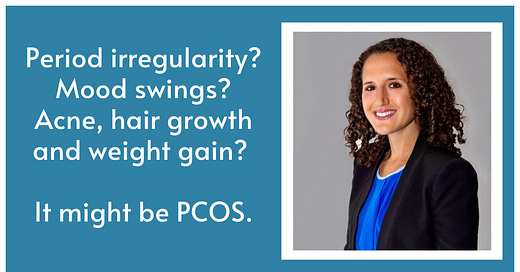In this informative episode, Dr. Reid Mergler, Assistant Professor of Clinical Psychiatry at University of Pennsylvania and Reproductive Psychiatrist at Penn Center for Women's Behavioral Wellness, describes how you can recognize this common diagnosis, Polycystic Ovary Syndrome (PCOS), and how to get the support you need.
🔍 The PCOS Reality Check
Affects approximately 10% of women (that's 1 in every 10!)
Often goes undiagnosed for years, especially in women on birth control
Can be misdiagnosed as bipolar disorder due to irregular mood patterns
🧠 The Mental Health Connection PCOS significantly increases risk for:
Depression and anxiety disorders
Eating disorders and body image issues
Sexual dysfunction
Sleep disturbances and mood swings
The Diagnostic Dilemma
🚨 Red Flags to Watch For:
Irregular periods that don't regulate after age 16
Difficulty losing weight despite diet and exercise
Severe acne that doesn't respond to typical treatments
Unwanted hair growth on face, chest, or other areas
Mood swings that don't follow a predictable pattern
Fertility Challenges
💡 Dr. Mergler's Screening Questions:
"When was your last menstrual period?"
"Are your periods fairly regular (every 21-35 days)?"
"Did your periods become regular only after starting birth control?"
🌐 Resources Mentioned:
Mass General's Women’s Mental Health Site: womensmentalhealth.org
Online PCOS support organizations, including PCOS Awareness Association
"Textbook of Women's Reproductive Mental Health" (APA)
If this episode resonated with you, please share it with someone who might benefit. Women's health deserves to be taken seriously, and knowledge is the first step toward better care.
About Dr. Reid Mergler, MD
Dr. Reid Mergler is an Assistant Professor of Clinical Psychiatry at the Perelman School of Medicine at the University of Pennsylvania. She works as a reproductive psychiatrist at the Penn Center for Women’s Behavioral Wellness where she specializes in women’s mental health across the lifespan. She completed her adult psychiatry residency at Tufts in June 2023 after completing an OB/GYN internship at Montefiore. She co-founded the National Reproductive Psychiatry Trainee Interest Group (Repro Psych Trainees) in 2021, providing monthly lectures and advocacy events to over 800 members. She is part of the Executive Council of the Association of Women Psychiatrists, and she is a member of the American Psychiatric Association Women’s Mental Health Council. She has a special interest in trauma-informed care, polycystic ovary syndrome, perimenopause and perinatal mood and anxiety disorders with national presentations and publications.
Dr. Reid on Instagram: @jenreidmd and LinkedIn and her upcoming book, Guilt Free!
Also check out Dr. Reid's regular contributions to Psychology Today: Think Like a Shrink.
Seeking a mental health provider? Try Psychology Today
National Suicide Prevention Lifeline: 1-800-273-8255
Dial 988 for mental health crisis support
SAMHSA's National Helpline - 1-800-662-HELP (4357)
-a free, confidential, 24/7, 365-day-a-year treatment referral and information service (in English and Spanish) for individuals and families facing mental and/or substance use disorders.
Disclaimer:
The views expressed on this podcast reflect those of the host and guests, and are not associated with any organization or academic site.
The information and other content provided on this podcast or in any linked materials, are not intended and should not be construed as medical advice, nor is the information a substitute for professional medical expertise or treatment. All content, including text, graphics, images and information, contained on or available through this website is for general information purposes only.
If you or any other person has a medical concern, you should consult with your health care provider or seek other professional medical treatment. Never disregard professional medical advice or delay in seeking it because of something that have read on this website, blog or in any linked materials. If you think you may have a medical emergency, call your doctor or emergency services (911) immediately. You can also access the National Suicide Help Line at 1-800-273-8255 or call 988 for mental health emergencies.














Share this post